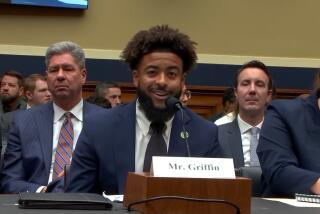Senate Panel Focuses on Athletes, Steroids
WASHINGTON — At age 16, Taylor Hooton stood 6 feet 3 and weighed 175 pounds when his baseball coach told him to “get bigger.” A year later and 30 pounds heavier, the teenager killed himself at his Plano, Texas, home.
“Taylor took his coach’s advice seriously,” said Donald Hooton, who testified about his son’s death before a Senate caucus Tuesday. “I’m convinced that anabolic steroids played a significant role in causing the severe depression that resulted in his suicide.”
Responding to the scourge of doping scandals in major league and Olympic sports, the Senate Caucus on International Narcotics Control used a hearing Tuesday to draw attention to the use of performance-enhancing supplements among young athletes.
Hooton was joined by Terry Madden, the chief executive of the U.S. Anti-Doping Agency, and William C. Martin, athletic director at the University of Michigan, along with a former steroid dealer, a medical expert and a varsity football player for an NCAA Division I school who testified behind a screen and was identified only as “John Doe.”
Describing the use of steroids by his teammates, the football player said the drugs were “extremely available.”
“You don’t have to look very far to find it,” he said. “And there’s south of the border and the Internet, if you don’t have a dealer who can get them for you.”
The player, led into the hearing room shielded by a green blanket and black hood, did not identify his school, saying only, “anyone watching college football has inevitably watched the school I played [for] at least once during the fall season when they are broadcast on national television, two to three games a year.”
Steroid use is increasingly becoming a health issue for young people, said Madden, whose agency tests and educates Olympic-level athletes.
“It’s creeping now into high schools, grade schools,” he said.
A 2003 study conducted by the University of Michigan found that 3.5% of American high-school students have used illegal anabolic steroids at least once. Only 45% of all 12th-graders believed taking steroids was a risk.
Easy access to steroids and performance-enhancing supplements has emerged as a significant hurdle to cleaning up high school and college sports. Sen. Charles E. Grassley (R-Iowa), the caucus chairman, said he was “amazed at just how easy it is to get this poison,” pointing to EBay auctions for information on obtaining dianabol, known as “d-bol,” an illegal steroid.
Joseph T. Rannazzisi, the deputy director of diversion control at the Drug Enforcement Administration, said his agency was working to fight online and illegal dealers, but he noted that its efforts have been hampered by the rapid evolution of steroids and steroid precursors -- drugs that act like steroids in the body but are treated like herbal supplements under the law.
In June, the House of Representative voted 408 to 3 to ban several steroid precursors, including androstenedione, the supplement made famous when baseball player Mark McGwire acknowledged using it. A similar bill reached an impasse in the Senate a few weeks ago.
During Tuesday’s hearing, several witnesses, Grassley and Sen. Joseph R. Biden Jr. (D-Del.) urged the Senate to pass the bill before the summer recess.
The recent investigation into BALCO, a Northern California nutritional supplement company, is shedding new light on the culture of doping, Madden said. BALCO’s founder and three other men connected to the lab were indicted for allegedly distributing illegal steroids to Olympic and professional athletes.
“I can assure you that it begins with coaches. The coaches have a strong role to play in this,” Madden said.
Coaches at the high school level are rarely trained to recognize the symptoms of steroid abuse, such as greasy skin, weight gain and mood swings.
“I think it’s just benign ignorance and then benign neglect,” said Hooton, who since his son’s death has become an advocate for better education for athletes, coaches and school officials.
Unreasonable expectations are also to blame, said Dr. Don Catlin, chief of the UCLA Olympic Analytical Laboratory, which does testing for USADA, the NCAA, NFL and Department of Defense.
“If your high school football coach says, ‘Put on 20 pounds over the summer and you will start in the fall,’ there is only one way to do it -- anabolic steroids,” he said.
More to Read
Go beyond the scoreboard
Get the latest on L.A.'s teams in the daily Sports Report newsletter.
You may occasionally receive promotional content from the Los Angeles Times.











